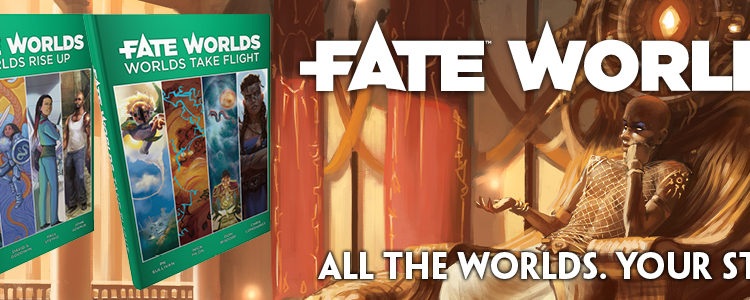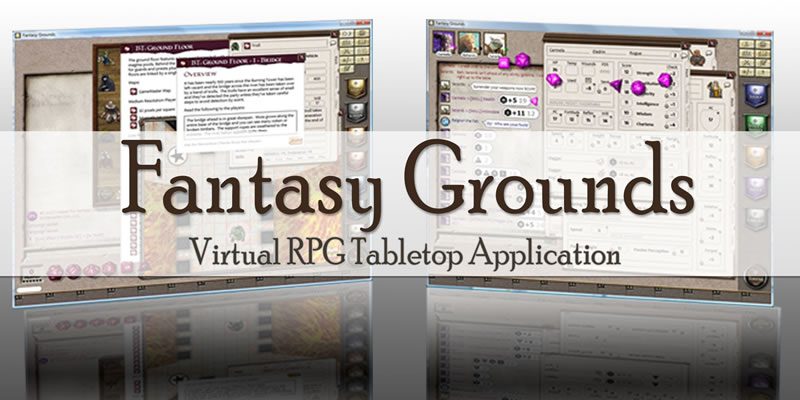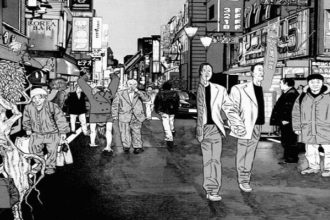Below it Tribality’s interview with Fred Hicks – the creative mind behind Evil Hat Productions and the Fate RPG.
First off, what sorts of things do you make & and how would you summarize your career with tabletop gaming?
I run Evil Hat as its president. We publish primarily roleplaying games, primarily using the Fate system which we developed, but we also publish things that aren’t Fate based, and we’re steadily moving our way into board and card games as well. I’ve also done some graphic design and layout and customer service work for other companies in the industry, including Hero Games and Indie Press Revolution, but these days Evil Hat occupies all my available work-time.

Fred Hicks
What’s your gaming ‘origin story’?
I first got into them by way of a playground friend named Eamon in the 3rd grade who was tinkering with the contents of the red box in plain sight. Got fascinated by the dice. Pretty much started hacking and houseruling the games I played from the get-go, but didn’t frequently have friends to play them with until I got towards high school and college. Played a ton of Amber and Fudge over those years, along with Champions, GURPS, Beyond the Supernatural, and a few others. Playing Amber online via a MUSH (multi-user shared hallucination) server got me most of the lasting connections & friendships I took into my professional life, in one way or another. Eventually I spent enough time around one of those friends, Rob Donoghue, that our natural tendency to consume and hack RPG systems gave birth to Fate, based on the Fudge system… which was just a weird little side project we did to support our own gaming. But we wanted to share it, and so we did, online, free, and it kinda took off. Enough so that we ended up with the license for the Dresden Files RPG by way of another online friend from those MUSHing days, Jim Butcher. Which gave us the spurs to turn Evil Hat from a casual label under which we did our game projects into a “real” game company around 2006 or so.
What are some of your earliest sources of inspiration? What inspires you now?
I’ve always been a media consumer (I mean, haven’t we all?) and a lot of my inspiration would come from a TV show or comic book or similar. I didn’t spend a lot of time coming up with my own settings and such, except in the lightest of senses, in part because I got ideas so readily supplied from media, and also because my heart was really more in the mechanics of games. In that sense I’m a bit of a gear-head. I look for interesting mechanisms, in and out of games, and think about how those would operate in a new context.
All that hasn’t really changed at any point in the last three decades, tho what I have time to do with it does change. Making games full time runs a real risk of leaving you with no time to play games, and adult life with kids adds another layer of complication to all of that. I’m also more focused on the business end of game making than ever before, which means there’s not as much that I do creatively, which is where inspiration particularly matters. Insofar as what inspires my business efforts, my kids are a big part of that, because I’m shaping a tiny corner of gamedom that they might themselves try to occupy someday. On the gaming side, I tend to reach for the familiar and comfortable simply for its efficiency. I’m running a Fate game right now (super familiar) in a Star Wars setting (also super familiar) and it’s been a breeze. But who knows? Maybe the pressure to focus on the business of Evil Hat will abate and I’ll be able to work on some creative endeavors again. If it doesn’t, though, I won’t mind; the biz stuff is plenty fun for me.
I guess my answer went off the rails a bit there, heh. Largely, I suspect, because I’m not sure I run on inspiration quite so much these days, vs. how things were ten, twenty years back. These days I have a notion of what’s now and what’s next, and I hit those hard as I can. Lather, rinse, repeat.
What are some of your favorite things made by other people?
The Fate Codex patreon project happened entirely without my prompting and I’m jazzed every time I see another issue come out. I’m thrilled to see how Sentinels of the Multiverse has grown over the past several years. But often as not my favorite things made by other people are the things the creative folk at Evil Hat are making. Bit of a cop-out as an answer goes, perhaps, but the company has a tendency to follow my own enthusiasms. 🙂
Where do you see the hobby going from here?
Well, it’s cyclical. I expect it to go where it’s gone before, each time incorporating a bit of something new. A lot of the ideas and techniques from the more experimental fringes of the hobby got admired and then adopted or adapted or reinvented by the center over the past ten years. And as much as our hobby’s a niche, it’s big enough, with enough sub-groups and tastes and whatnot in it, that some idea’s always new to someone when it finally hits a trajectory that puts it in their orbit. I wish there wasn’t quite so much tribalism that rose out of that, but it seems inevitable. I’d be more concerned if there weren’t always people out there looking across the supposed dividing lines and borrowing a little something from both column A and B to make their new thing. Someone out there’s gonna find a way to make OSR and Nordic LARP and Apocalypse World work together, at least in part, someday, and we’ll be off to the next cycle. Or maybe it’ll be some other alchemical mixture, funded by the crowd, delivered to their doorsteps.
On the business side of things we’re in an interesting timeframe, I think, post-Forge, but pre-whatever-comes-next. Indie or formerly-indie publishers that are still going a decade later, the “start ups” from the Forge era (not to imply that the Forge population’s the only thing that was going on then, I’m just reaching for a convenient identifier here), are in a position to become the new old guard, perhaps. What that’ll mean will depend on how each publisher chooses to deal with that.
Crowdfunding will continue to be a thing because the game business is full of high risk low reward financially speaking, and any tool that addresses and mitigates those risks is gonna be a keeper — just like print-on-demand technology was ten years back when Evil Hat got started publishing. And more recently DriveThruCards has shown us that print on demand card-printing is more viable than it’s ever been. I feel we’re already in the middle of a board & card game design revolution the way we had in RPGs earlier — earlier mainly because the means of easy/cheap/low-quantity production happened earlier for books than it did for cards.
So I’m wondering what technology for tabletop is difficult today that’s poised to become easier tomorrow because that’s the trend I’ve seen, of technology triggering change.
Maybe virtual tabletops will get even better, smarter, more intuitive, and the next evolution will happen on the players’ side, with geographic proximity becoming less and less necessary to have the exact same gaming experience you’d have when your friends come over to the house for an evening of games. I’d like that. I spend too much time in my house as it is, and most of my friends in gaming don’t even live in the same time zone.
Or maybe the “difficult thing” will be something like distribution and shipping and such. If someone can crack that nut — particularly in the face of steadily rising shipping costs — who knows what will follow? Or if that nut’s unbreakable, maybe the hobby’s pivot towards electronic delivery will become more complete, and force new changes in how we format and deliver electronic content. (Personally I hope we don’t walk away from paper entirely, mainly because the pricepoints that the electronic market will bear are not high enough to viably sustain that content without the cash-flow from the paper side covering the rest of the budget.)
Can you talk about what you’re working on now/upcoming projects?
No? Maybe? Well. Hm. We have some board games in development that I can’t talk about yet. We have some RPG deals that we’re working on that I can’t talk about yet. Most of the stuff I can talk about we’ve got listed on the Evil Hat project status page at
http://www.evilhat.com/home/project-status/ — and that list is long enough that getting into the individual elements would be longer than this whole interview. 🙂
As far as what I’ve been working on lately, tho, I’ve been focused heavily on getting the Dresden Files Cooperative Card Game off to the manufacturer. The expansions that the Kickstarter funded for that follow close on. I’ve also been getting another card game ready to go called Kaiju Incorporated, a satirical game that’s sort of like Pacific Rim if Hannibal Chau were the CEO of a multinational corporation instead of a black marketeer. We’re also working on a tie-in RPG for Kaiju Incorporated. We’re making steady progress on launching a new line of Fate Toolkits covering a variety of topics — I just wrapped first-phase layout on the Fate Adversary Toolkit. We’ve also got new Fate Worlds coming out nearly every month thanks to our Patreon campaign. But that’s just what’s on my immediate plate. Like I said, have a look at the Project Status page to get a notion of the full picture. 🙂
What would you like your legacy as a maker to be?
Overall I’m simply hoping for an easier on-ramp for the folks who come after. When I started out I was really frustrated by the amount of information that wasn’t simply out there about RPG publishing and sales performance and all that, which is why I started in on the whole “pathologically transparent” thing I do, sharing sales numbers, talking about the business processes of publishing, etc. I did my best to be accessible and informative well before every big company had a twitter presence, y’know. So I guess in that sense I hit the trend before it was a trend. 🙂
I’ve also been happy to see things that I’ve helped start, like Bits & Mortar, gain more traction over the years. It never made sense to me that a book didn’t come with a free PDF of the content I was already buying in book form. Over time more publishers started seeing things the same way. And hell, we just signed up Chaosium — Chaosium! — at Bits & Mortar, so clearly it’s an idea that’s continuing to make sense to people, publishers and gamers alike.
You’ve had some incredible success using Kickstarter to fund your game publishing -first with Fate Core, and most recently with the Dresden Files Cooperative Card Game- in addition to using Patreon for ongoing support. How has crowd funding shaped the way you publish and what role do you see it playing for you/Evil Hat in the future?
Well, the Dresden Files Cooperative Card Game was our ninth Kickstarter campaign. We’ve built some experience there. 🙂
Crowdfunding was one of those things that came along and resembled things we’d already been doing enough that it made sense for us to head in that direction eventually. In 2006 with the launch of Spirit of the Century, we ran a preorder with Indie Press Revolution where folks got the PDF of the game right away when they preordered the book. That gave us time and funding up front to figure out how much we should be printing. Which… doesn’t sound that much different from a crowdfund campaign, when it comes down to it. So more than anything I’d say that crowdfunding happened to fit a sales technique we were already exploring, more than it shaped what we were doing.
Patreon has been a different beast in that regard. Without a viable “subscription model” option in crowdfunding, we likely wouldn’t have started the Fate Worlds project at all, and that has produced an incredible variety of content for Fate over the last two years, as well as operating as a great environment for developing new creative talent at the Hat. That’s helped us plant our feet well for bigger projects to come.
Any themes that come up in your work? How do your personal values/obsessions shape your work (and how are they immaterial)?
As I may have said before I don’t get much time to do creative work these days, as I’m more focused on the business side of things. That might change in the future, of course, but I’m not upset if it doesn’t. That said, probably the strongest theme I’ve had going is… how to put this? It’s not a question of whether you’ll succeed, but rather how much it will cost you to succeed, and whether or not you want to pay the price. There’s a lot of pain and personal investment hanging on that, so it’s something I’ve always enjoyed coming back to in my gaming.
As someone living inside my personal values and obsessions, I’m not sure I have the best perspective on how they shape my work. The work should speak to that. 🙂
What advice would you give to young makers who are interested in getting involved?
Don’t quit your day job.:)
Horribly cynical, I know! But drawing a reasonably-sized, living-wage paycheck is a rarity in this business, and for me personally after ten years of building a company is still a relatively new phenomenon. This hobby business works because people are putting aside time in their evenings and weekends to create things. You gotta take care of putting food on your table before you can really consider doing that.
As to the actual work, please, young designers, put aside notions of doing your pet project, your “big one”, as your first project. Get ready to fail and fail often and learn from every failure. Start projects with that in mind. When we got the Dresden Files RPG rights — kicking off the creation of the company — we put our attention to doing other projects first, so we had something less important we could make our mistakes with.
Learn enough about how to self-publish to answer the question of whether or not it’s something you want to pursue. Also to give you options if you decide you want to get your work published by someone else, only to find that nobody else is interested. In the social media age it’s more important that you get your work out there, visible, and played, then it is to put it out on one particular path, one channel. Fire that shotgun until you hit a target. Then do it again until you hit another.
Lather, rinse, repeat.
Was there anything I forgot to ask?
—





